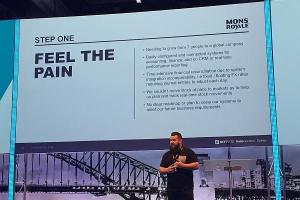Published on the 11/10/2016 | Written by Hayden McCall

Recent customer parade all about the steak, not the sizzle…
New Zealand merino apparel up-start Mons Royale was the only customer on stage for NetSuite’s annual customer and partner event in Sydney with plans to implement the vendor’s software as a fully integrated end-to-end business system.
The rest of the customers showcased have implemented the “world’s #1 cloud ERP” solely to run their company’s financials. It is a common scenario that NetSuite is not facing alone.
The oft-touted benefits of integrated ERP are being challenged by cloud solutions that claim to be easy to use and meet specific operational or vertical industry requirements. The ease of Software-as-a-Service (SaaS) procurement means that business teams buy what they want, and leave the bean counters and IT to clean up the financials and integration issues.
Modular ERP pricing models encourage the buyer onto platforms with financials first and the option to plug-in additional modules later. The captive buyer should be very wary of the additional licensing and implementation costs and, despite what the vendors will claim, factor in a likely integration overhead.
Too bloody expensive
NetSuite community insiders spoken to at the event say the financials-only approach is a result of the licensing model for SuiteCommerce. Translated, the company’s integrated omnichannel e-commerce and marketing solution is too bloody expensive for most growing companies to afford.
Publicly quoted NetSuite pricing from a partner in the US lists the base financials module at US$1k/month – this increases five-fold if you want to run SuiteCommerce (these figures exclude per user fees).
Locally, NetSuite advises prospects to request a quote directly or via a partner – but the quantum is likely to be similar. Regardless, compared with simple off-the-shelf e-commerce options such as Magento or Shopify that come with costs as low as US$15/user/month, combined with any number of marketing automation tools and e-mail engines, the difference takes quite a lot of convincing.
Core to every ERP implementation is the financials suite – general ledger, accounts receivable and payable and related company reporting. Virtually every financial accounting system on the planet from Accpac to Xero delivers these capabilities, albeit with varying degrees of elegance.
But to earn the tag, ERP vendors have invested plenty more to integrate their core financial modules such as manufacturing, inventory, supply chain and omnichannel e-commerce. Their challenge is to earn a return on that investment, while remaining competitive in a post-modern ERP world.
A new set of rules
And so it was for NetSuite at the SuiteConnect 2016 conference in Sydney as the company again positioned itself as a leader in a world where “every company is a cloud company”, and where the “power of data aggregation” and “mobile first design” put it ahead of other old-world ERP players.
Jayson Maynard, NetSuite’s EVP for strategy and corporate development was flown in from the company’s Silicon Valley HQ for the event: “There is a new set of rules for the cloud world. Business models are hybridising. Product, service and as-a-service models are overlapping,” he advised. And, naturally, NetSuite is the tool to support businesses to embrace those capabilities.
The evidence was to be made clear with the customers presenting at the event. And the list is impressive. REA Group – News Corp’s mega-profitable global property listing empire (realestate.com.au and realtor.com among others); Emma & Tom’s – the super-premium juice brand; and wealth management company Yellow Brick Road. But scratching under the surface, despite the hybridisation of services and products among these companies, all have bought NetSuite because of its multi-currency, multi-lingual and multi-company features, which it clearly does very well.
To be fair, not all will have been constrained by price, but still, it’s a bit of a yawn.
The odd one out’s a (bearded) Kiwi
That is, all but the not-so-little Wanaka company Mons Royale.
Chief operating officer Ben Irving is a self-proclaimed NetSuite fan-boy after his company rapidly outgrew Xero with inventory plug-in Unleashed, by-passed SAP Business One and Salesforce, and confronted a “we couldn’t justify not going with NetSuite” moment.
Like the others, the initial implementation was NetSuite OneWorld – providing the global financial management capability they needed, along with its (included – granted) inventory management capability. “Real-time meant real-time, so we integrated with third party warehouses and customer POS systems to track inventory accurately in (near) real-time through the entire supply chain – from our Chinese manufacturer through 20 warehouses and on to 450 retail outlets globally” said Irving.
 Hipster beard aside, Irving is the kind of guy you need in this type of business. “With a staff that would rather be carving up the slopes than messing around with back office reconciliations, we have to relentlessly build efficiency and automation,” he said.
Hipster beard aside, Irving is the kind of guy you need in this type of business. “With a staff that would rather be carving up the slopes than messing around with back office reconciliations, we have to relentlessly build efficiency and automation,” he said.
His advice for doing it successfully?: “Feel the pain (with your current system shortcomings); take the first step (integrate and automate toward a single source of the truth), and; commit to your future (own it, lead it and protect it on the roadmap forward).”
Irving next move toward protecting the company’s future is to extend the NetSuite footprint further, later this year, by bringing SuiteCommerce into the picture – providing Mons with fully integrated website content management, personalised e-commerce experiences for B2B and B2C buyers, and built-in marketing automation capabilities.
It’s a bold decision that Mons founder Hamish Acland hasn’t always been on board with: “Yes he and I have robust discussions, he often asks if this NetSuite system of mine is really delivering the value”. That won’t really be tested until post-implementation, but one gets the sense that with Irving’s determination behind it, fortune will favour the brave for Mons Royale.
At the same time, NetSuite will be hoping the same applies as it awaits its fate in this brave new world from within the Oracle machine.
The writer was a guest of NetSuite at the event.




























Hmm too pricey compared to what? Hayden can tell me the one package that does what Netsuite does for the same price or less. We have done this evaluation and struggled. Stitching together multiple Saas’s is not comparing apples with apples. How do value the time and frustration of systems not talking to each other when u most need them to? Netsuite gets my vote.
Emma and Tom’s is an interesting one, as they did not buy Netsuite, they bought the much cheaper low cost option which is exclusively marketed by a independent company under a completely different brand – in effect they are not even a NetSuite customer.
Thanks Bob. Yes Emma & Tom’s implemented the JCurve solution, which is a cut down version of Netsuite OneWorld, targeted at businesses with less than 25 users (and priced accordingly). However the core application IP is still owned and managed by Netsuite, and hosted under Netsuite’s shared tenancy arrangements, so I think can be legitimately claimed as a Netsuite customer.